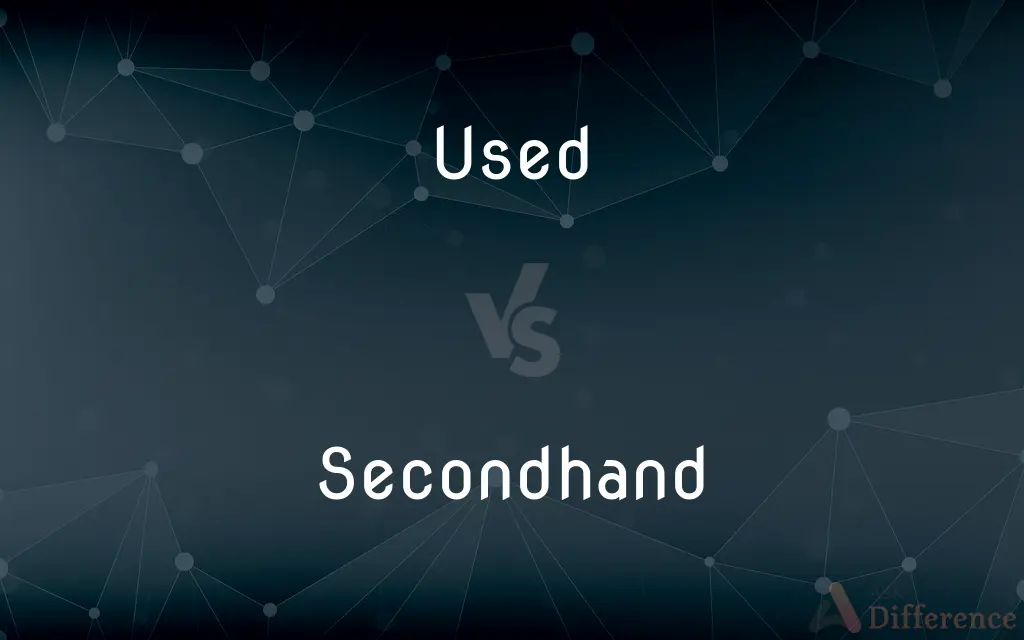Used vs. Secondhand — What's the Difference?
By Tayyaba Rehman & Maham Liaqat — Updated on April 16, 2024
"Used" broadly describes items previously owned and utilized, implying general wear, while "secondhand" specifically denotes ownership transfer without suggesting condition.

Difference Between Used and Secondhand
Table of Contents
ADVERTISEMENT
Key Differences
The term "used" refers to any items that have been previously owned and operated by someone else, indicating that the item has served its purpose to some extent before being sold or passed on. This can apply to a wide range of items from cars to clothing. On the other hand, "secondhand" specifically indicates that an item has changed hands from the original owner to another, focusing more on the aspect of transfer rather than the condition or extent of use.
When discussing marketplaces, "used" items are often sold through various channels including online platforms, thrift stores, or garage sales, typically at reduced prices due to their worn condition. Whereas secondhand items might also be found in similar venues but are sometimes curated, such as in vintage or antique stores where the items are valued for their age and history rather than just their utility.
In terms of perception, items labeled as "used" might be viewed as more worn or depreciated, which could influence their desirability and value. Conversely, secondhand items can sometimes carry a notion of uniqueness or nostalgia, especially if they are antique or collectible, potentially making them more appealing to certain buyers.
The condition of "used" items is generally expected to show signs of wear and functioning consistent with previous usage. This can affect their pricing and suitability for certain buyers looking for a bargain or a short-term solution. On the contrary, secondhand items might not always show obvious signs of wear; their value and appeal can be influenced more by their origin, previous ownership, or rarity.
From a sustainability perspective, purchasing both used and secondhand items can be seen as environmentally beneficial by reducing waste and the need for new resources. However, the secondhand market also includes items like books, art, and collectibles, where the focus may be more on preservation and collecting rather than just reuse.
ADVERTISEMENT
Comparison Chart
Definition
Previously owned and utilized
Previously owned, passed to new owner
Focus
Wear and functionality
Transfer of ownership
Typical Marketplaces
Thrift stores, online marketplaces
Vintage shops, antique stores
Perceived Value
Lower due to wear
May be higher due to uniqueness
Condition Expectation
Visible signs of wear
Not necessarily visibly worn
Compare with Definitions
Used
Exploited or utilized in the past.
The technique used in this project was quite innovative.
Secondhand
Not new. previously used.
She loves shopping at secondhand stores for vintage jewelry.
Used
Employed for a purpose before.
This used smartphone works just as well as a new one.
Secondhand
Acquired from the original owner by another.
He deals exclusively in secondhand goods.
Used
Worn or secondhand.
Used clothing often goes to thrift stores.
Secondhand
Involving an intermediate or direct from the original.
Buying furniture secondhand can save a lot of money.
Used
Not new. showing signs of wear.
He prefers used books because they are cheaper.
Secondhand
Information or knowledge obtained from another source.
Most of what I know about him is secondhand.
Used
Previously utilized by someone.
She bought a used car from the dealership.
Secondhand
Previously owned, especially referring to clothes or books.
Secondhand books can be treasures hidden in plain sight.
Used
Not new; secondhand
A used car.
Secondhand
Previously used by another; not new.
Used
(also yst) Accustomed; habituated
Getting used to the cold weather.
Was used to driving a small car.
Secondhand
Dealing in previously used merchandise.
Used
Simple past tense and past participle of use
You used me!
Secondhand
Obtained, derived, or borrowed from another; not original.
Used
To perform habitually; to be accustomed [to doing something].
He used to live here, but moved away last year.
The club used to be frequented by locals; then, after the "incident", it used to get raided by the cops.
Secondhand
In an indirect manner; indirectly.
Used
That is or has or have been used.
The ground was littered with used syringes left behind by drug abusers.
Secondhand
(of goods) Not new; previously owned and used by another.
Used
That has or have previously been owned by someone else.
He bought a used car.
Secondhand
(of a dealer) Dealing in such merchandise.
Used
Familiar through use; usual; accustomed.
I got used to this weather.
Secondhand
(figurative) Indirect; from a secondary source; not firsthand.
Used
Employed in accomplishing something;
The principle of surprise is the most used and misused of all the principles of war
Secondhand
(of cigarette or cigar smoke) inhaled from the air near someone else smoking.
Exposure to secondhand smoke from cigarette-smoking colleagues
Used
Of persons; taken advantage of;
After going out of his way to help his friend get the job he felt not appreciated but used
Secondhand
Secondhand goods (especially clothes) collectively.
Used
Previously used or owned by another;
Bought a secondhand (or used) car
Secondhand
In a used or previously-owned condition.
Secondhand
Indirectly
Secondhand
Not original or primary; received from another; as, secondhand information.
They have but a secondhand or implicit knowledge.
Secondhand
Not new; already or previously possessed or used by another; as, a secondhand book, garment.
Secondhand
Derived from what is primary or original; not firsthand;
A secondhand report
A secondhand account of a memory of something once read
Most of our knowledge is secondhand
Secondhand
Previously used or owned by another;
Bought a secondhand (or used) car
Secondhand
By indirect means;
I heard about it only secondhand or thirdhand
He prefers to buy secondhand
Common Curiosities
What defines an item as used?
An item is defined as used if it has been previously utilized in any capacity.
Can secondhand items be considered collectibles?
Yes, especially if they are vintage or have historical value.
Is buying used more sustainable?
Yes, it reduces the demand for new products and the associated environmental impact.
Are used items always cheaper?
Typically, yes, because they show signs of wear or use.
How does secondhand differ from used?
Secondhand specifically refers to the transfer of ownership, regardless of the item's condition.
Are there risks in buying secondhand electronics?
Yes, such as potential hidden defects and lack of warranty.
Why do people buy secondhand?
For cost savings, unique finds, or environmental reasons.
What should I check when buying a used car?
Assess the car's condition, mileage, and maintenance records.
Can a used item be sold as new?
Legally, it should not be sold as new if it has been previously used.
How can I ensure a used item is still good?
Before buying any used item make sure to check them properly.
Share Your Discovery

Previous Comparison
Mishna vs. Talmud
Next Comparison
Experienced vs. MatureAuthor Spotlight
Written by
Tayyaba RehmanTayyaba Rehman is a distinguished writer, currently serving as a primary contributor to askdifference.com. As a researcher in semantics and etymology, Tayyaba's passion for the complexity of languages and their distinctions has found a perfect home on the platform. Tayyaba delves into the intricacies of language, distinguishing between commonly confused words and phrases, thereby providing clarity for readers worldwide.
Co-written by
Maham Liaqat













































